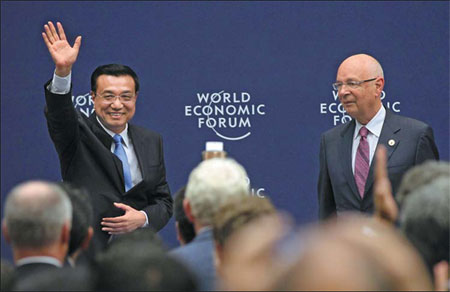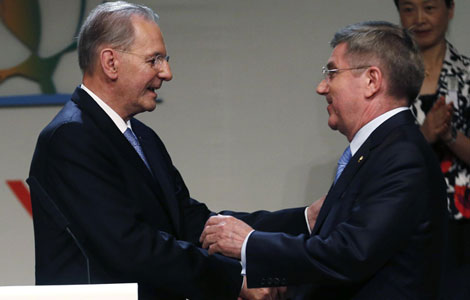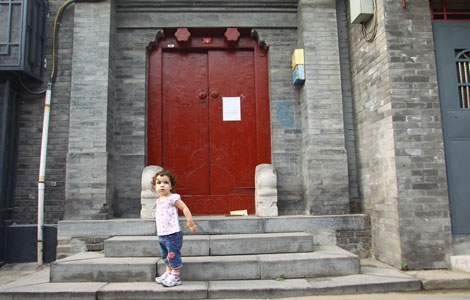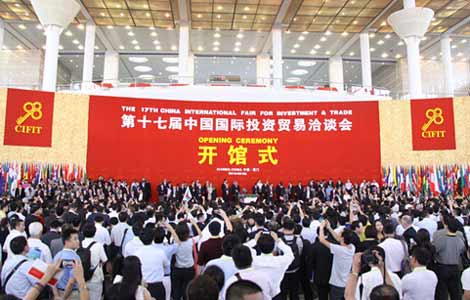Li vows to provide more jobs
Updated: 2013-09-11 08:08
By Ding Qingfen in Dalian and Chen Jia in Beijing (China Daily)
|
||||||||
Premier confident of steady growth, expecting reform to release 'biggest bonus'
China will strive to generate more jobs in coming years by launching additional reform policies and placing greater emphasis on the service sector's role, Premier Li Keqiang said on Tuesday.
He highlighted the government's task of assuring people's livelihoods, saying this to a great extent means providing jobs.
The premier's comments came as he met a group of global business executives before the World Economic Forum Annual Meeting of the New Champions 2013, or the "Summer Davos" in Dalian.
Li stressed that China is able to tackle difficulties and challenges in the course of its economic development, as reform can release the "biggest bonus" to boost the market's vitality.
Instead of taking short-term stimulus measures to bolster the economy, China has focused on reform polices and economic restructuring to boost growth, with these measures having some effect.
Main economic indicators such as the Purchasing Managers' Index have suggested positive signs, he said.
The manufacturing PMI, which reflects factory production activity, rose to 51 in August from 50.3 in July, indicating the fastest expansion of the industry in 16 months.
A reading above 50 indicates activity in the sector is accelerating, while one below 50 points to a slowdown.
Li said China will be able to achieve long-term and healthy growth based on three basic factors.
These are huge potential for domestic demand in the industrialization and urbanization process; reform to eliminate obstacles in the government management system; and improvement in growth quality and efficiency based on increasing people's incomes and consumption.
"For the government, the top priority is to ensure sufficient employment," he said.
Li said the government will adopt a long-term, proactive employment policy, accelerate the service industry and promote occupational training to keep the labor market stable.
Chris Leung, a senior economist at DBS Bank in Singapore, said China is expected to maintain stable economic growth and achieve the 7.5 percent growth target set for this year, boosted by a series of positive economic figures for trade and inflation.
"The present macroeconomic environment is much different from the late-1990s, when conventional Keynesian and monetarist approaches could be applied aptly," said Leung, who added that he believes the policy taken by the Chinese government will neither over-stimulate the economy, nor allow it to sink further.
The country's economic growth slowed to 7.5 percent in the second quarter, down from 7.7 percent for the first. It was the ninth deceleration in the past 10 quarters.
Investors had feared the economy was slipping into a deeper-than-expected downturn, especially after the money market suffered an unprecedented cash crunch in June.
But the central government has introduced measures to stabilize the economy, including small-scale investment on railways and public housing construction and the launch of policies to help small companies in need of financing.
The country's policymakers have repeatedly said China is capable of reaching this year's economic growth target.
Li also said on Tuesday that the government is studying the launch of a deposit insurance system, further opening up the financial market and encouraging more Chinese enterprises to expand business overseas.
Earlier, in an opinion piece published in the Financial Times, Li wrote that China will maintain healthy growth in the long term and will continue its reform and opening-up program.
Economists said the recent positive economic figures will leave room for China to push forward the reform initiatives and restructure the economy away from dependence on credit, investment and exports toward growth driven by consumption.
Zhu Haibin, chief Chinese economist at JPMorgan, said the ongoing economic reform and restructuring, which are the top priority for the new leadership, will benefit China's growth in the long term, although they may slow it in the short term.
"In particular, overcapacity and low investment efficiency in a number of sectors, as well as credit imbalances and rising leverages accumulated in the past four to five years, remain the major challenges to be addressed by the new leadership in the coming years," Zhu said.
Li is scheduled to give a keynote speech at the Dalian forum on Wednesday on China's economic growth and policy.
Contact the writers at dingqingfen@chinadaily.com.cn and chenjia1@chinadaily.com.cn
|
Premier Li Keqiang, accompanied by Klaus Schwab, executive chairman of the World Economic Forum, meets business representatives before the World Economic Forum Annual Meeting of the New Champions, also known as the "Summer Davos", in Dalian on Tuesday. The three-day forum is scheduled to start on Wednesday. Zou Hong / China Daily |
(China Daily USA 09/11/2013 page1)
Most Viewed
Editor's Picks

|

|

|

|

|

|
Today's Top News
Russia proposal likely to avert US air strikes
China's Hawaii goes fishing for talent
IPO to land deals in Hollywood
Timetable not set for Six-Party Talks
Li plots the economic course ahead
New iPhones a dud in China, so far
Kerry to meet Russian counterparts over Syria
Trending news across China
US Weekly

|

|















